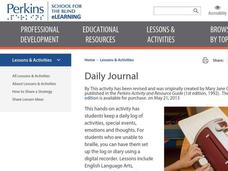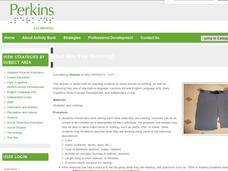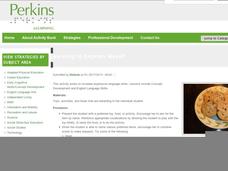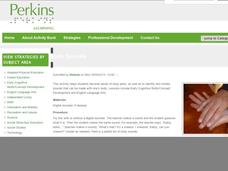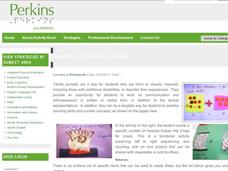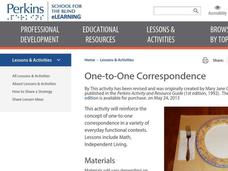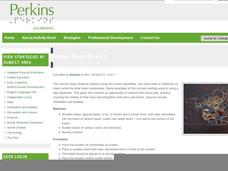Perkins School for the Blind
Taking Turns
For small children or learners with disabilities, learning to wait patiently and taking turns is very important. In pairs, two children with visual impairments take turns asking for, waiting for, and playing with a musical toy. Each turn...
Perkins School for the Blind
Daily Journal
Keeping a daily journal is fun. It builds strong writing skills and provides an expressive outlet. For children with visual impairments, it's even more important. It provides a way for them to connect written word with real events, which...
Perkins School for the Blind
Learning Names of Articles of Clothing
What to wear today; such a vexing question. Spend some time introducing the names, fabrics, types, colors, and functions of various articles of clothing to your class. Each child will take turns asking each other what they are wearing....
Perkins School for the Blind
Learning to Express Myself
Expressing one's wants and needs is vital for learners of any age or ability level. Young children with visual impairments and intellectual disabilities practice asking for preferred items, foods, or activities in a structured manner....
Perkins School for the Blind
Learning to Identify Sounds Made by the Body
Sneeze, snap, tap, and whistle; Did I do that? Explore the parts and sounds of the human body with your learners with visual impairments. First you'll name the parts of the body, make a sound with each part, and then have the class guess...
Perkins School for the Blind
Tactile Journals
I absolutely love this idea. Children with visual impairments create tactile journals which describe an event from the previous week in an artistic way. They verbally describe one event from the previous week and then use a wide array of...
Perkins School for the Blind
Let's Pretend
Playing pretend with real objects or concepts is a wonderful way for learners to make object-to-action connections, as well as practice daily living skills. Learners with visual and intellectual disabilities use a wide variety of real...
Perkins School for the Blind
Initial Consonant Activity
Bingo is a super fun game and can be used to reinforce a vast number of recognition skills. These bingo cards are prepared by constructing nine squares, each delineated with raised Wikki Stix or gluedyarn and containing a braille...
Perkins School for the Blind
Conversation Skills
It is so important for learners with multiple disabilities to learn how to communicate for both social and functional reasons. Each child will choose a topic from the list and generate five questions related to that topic. They'll split...
Perkins School for the Blind
Hat Game
Sometimes the simplest ideas foster a lot of different skills. To boost social skills, group participation, identifying others by name, and dressing skills, learners play the hat game. They take turns wearing a hat while singing a song...
Perkins School for the Blind
Put the Shoe on Your Foot
Promote clothing identification, body part identification, and dressing skills acquisition with a fun and lively game. Each child takes turns grabbing a clothing item from the central clothing box. As he puts the item on, he sings, "Put...
Perkins School for the Blind
Circle Time
Oftentimes children or teens with one or more disability are reluctant to participate in whole-group activities. Foster good participation, verbal expression, and social skills through daily circle time activities. Each day you and your...
Perkins School for the Blind
Personal Information
"Hi, how are you? My name is___." Seems simple enough but it's not always that easy to recall and relate factual information about yourself. Learners with multiple disabilities practice memorizing and relaying personal information about...
Perkins School for the Blind
Build a Word
Get out those scrabble tiles and a braille tape labeler because today we are playing a build-a-word game! Label several sets of scrabble tiles using the braille labeler, place them in a box, and have children take turns pulling letter...
Curated OER
Making a desk organizer for students who are blind or visually impaired
Organization is of the utmost importance when teaching orientation and mobility to learners with visual impairments. To help keep everything in order and provide independence, use these instructions for making a desk organizer. The...
Perkins School for the Blind
Wheel of Fortune Game
Games are great for practicing any number of basic skills. Here is a set of wonderful instructions for making a braille version of a spinning game, where children win points by correctly reading/identifying the high-frequency words the...
Perkins School for the Blind
Kitchen Clean-up
If you make a meal, you must clean up the mess. Foster a sense of independence while having learners practice a skill they can use in the workplace. Teens with visual impairments practice cleaning, organizing, stacking, and sorting a...
Perkins School for the Blind
Coin Identification
You got some money, and you're not afraid to use it. Before you can use that money, you need to know what it's worth. Included is a set of activity instructions that will help your visually impaired learners indentify coins. Pupils are...
Perkins School for the Blind
Planning a Special Event
I love planning parties, they are a great way to get social, require organizational skills, and engage cooperative problem solving. Teens with visual impairments put their heads together to plan an event for their friends. They choose an...
Perkins School for the Blind
Counting in Tactile Journals
This is one of those great ideas I totally love. Youngsters with visual impairments practice counting and left-to -right sequencing by counting out a set number of edible objects from the left and putting them in a bag on the right. They...
Perkins School for the Blind
Eating Out
Going out to lunch, reading a menu, making choices, and spending time socializing are all parts of growing up. Teens with visual impairments use several braille menus from local restaurants to practice ordering and appropriatelyeating...
Perkins School for the Blind
One-to-One Correspondence
Here is an interesting way to build concept understanding regarding one-to-one correspondence. Learners with visual impairments will use an array of everyday objects in context to foster an understanding of what one-to-one correspondence...
Perkins School for the Blind
Rubber Band Stretch
If you don't teach blind or visually impaired students, this lesson may seem a bit strange. But, it helps them develop motor skills, orientation and movement skills, and listening skills, while building a better understanding of...
Perkins School for the Blind
Balance Stations
Children with visual impairments need to continuously work on balance, gross motor skills, and mobility. Foster mobility and orientation skills by engaging them in a series of fun balance stations during PE. You'll set up each of the...
Other popular searches
- Gifted and Talented
- Gifted and Talented Math
- Gifted and Talented Education
- Gifted and Talented Lessons
- Gifted and Talented Reading
- Gifted and Talented Science
- Gifted Students
- Gifted Lessons
- Gifted and Talented Art
- Gifted and Talented Writing
- Gifted Literature Circle
- Gifted and Talented Students



